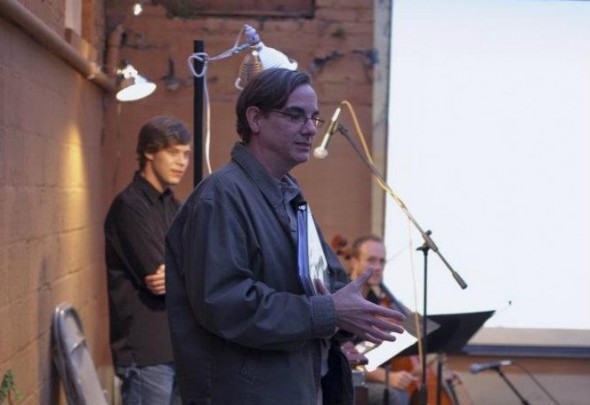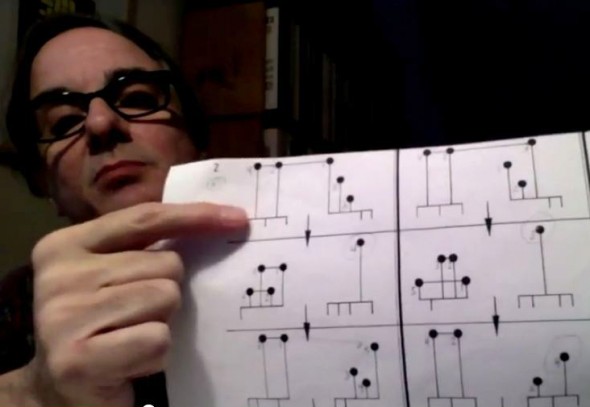
Rodger Coleman. Photo by Kim Sherman.
Tonight at 6pm, Zeitgeist Gallery‘s fantastic Indeterminacies series is kicking off the fall season with a free improvisation duet between Nashville pianist Rodger Coleman and Richmond, VA drummer Sam Byrd. Rodger writes the excellent music blog Nu-Void, and I believe I’ve seen him in attendance at every Indeterminacies show.
The discussion will be led by composer, former Indeterminacies guest, and Vanderbilt professor Stan Link. Up until this year, I released the Indeterminacies shows as podcasts, and you can hear Stan’s among the rest. (I had to stop because of time constraints.)
Rodger wrote a commentary on his upcoming performance at Nu-Void. It’s a really thoughtful read, and I recommend you check it out. Like any self-reflective artist, he begins with trepidations:
On Thursday, September 6, I will be playing improvised piano/drums duets with my friend and former bandmate, Sam Byrd, at the opening Indeterminacies event at Zeitgeist Gallery. This will be first time I have performed in public since the dissolution of UYA in 1995 and the first time on piano since…when?…1984? I can’t remember. I’m a little bit nervous—not so much about the music (Sam always inspires me to play beyond my abilities—which is why I insisted he travel from Richmond to join me)—but more concerned about the discussion segments, which will be led by Vanderbilt professor, Stan Link. Stan is a good friend and I’m sure he’ll go easy on me, but he is a brilliant and articulate composer with deep suspicions about the whole notion of improvisation as a legitimate artistic practice. Of course, this is what makes Indeterminacies unique: these are not concerts per se; they are investigations into the phenomena of performance and reception, critical thinking and audience participation. The result is unscripted, deliberately indeterminate and always challenging. We will be required to explain and, perhaps, justify and defend whatever it is we’re doing from rhetorical attacks from Stan and a potentially hostile, disapproving audience. Maybe not, but I’d be disappointed if we weren’t.
Stan goes on to quote Christopher Small in his book Musicking: The Meanings of Performing and Listening. I’ve been thinking quite a lot lately on the nature of art, aesthetics, and the limits of our judgement calls, and Small’s quote really struck a chord with me:
Music is not a thing at all but an activity, something that people do. The apparent thing “music” is a figment, an abstraction of the action, whose reality vanishes as soon as we examine it at all closely. This habit of thinking in abstractions, of taking from an action what appears to be its essence and giving that essence a name, is probably as old as language; it is useful in the conceptualizing of our world but it has its dangers. It is very easy to come to think of the abstraction as more real than the reality it represents, to think, for example, of those abstractions we call love, hate, good and evil as having an existence apart of the acts of loving, hating, or performing good and evil deeds and even to think of them as being in some way more real than the acts themselves, a kind of universal or ideal lying behind and suffusing the actions. This is the trap of reifications, and it has been a besetting fault of Western thinking ever since Plato, who was one of its earliest perpetrators.
When we say a piece of music is “good” or “bad,” some of us mean more than an aesthetic choice. Some of us really believe that the work is intrinsically, inherently imbued with this quality. “Mozart’s music is beautiful, and if you don’t agree, you are wrong.” (Substitute Mozart with Brittany Spears, Kandinsky, or any other artist.) But an aesthetic judgement means nothing without an observer. And observers see reality through their own customized filter of life experience and perceptive and cognitive uniqueness (for example, the degree one is able to perceive pitch or taste bitter). I get an uncomfortable feeling in the pit of my stomach when art professors authoritatively stamp good and bad, right and wrong. But this doesn’t mean the role of critic or theory professor is useless. Because of the professor’s point of view, not in spite of it, she can steer students towards different approaches in understanding. The professor can make comparisons and present an aesthetically constructed narrative. But we have to be careful to not see it as gospel. It’s a point of view. The aesthetic judgement is just a link between the observer and the observed. It’s not an inherent quality of either.
In other words, if a person’s opinion contributes to your understanding and appreciation of a piece of work (whether that person is a professor or a blue-haired teenager), take it. If it doesn’t, leave it.
And if they say you are wrong, tell them to go fuck themselves.
Do read Stan’s commentary. The aesthetic link between me and it is this: “It’s great.” I really look forward to tonight’s Indeterminacies.
More info on the event’s Facebook page.
September 6th, 6pm
Indeterminacies with Rodger Coleman, Sam Byrd, and Stan Link
Zeitgeist Gallery
1819 21st Avenue South
Nashville, Tennessee



